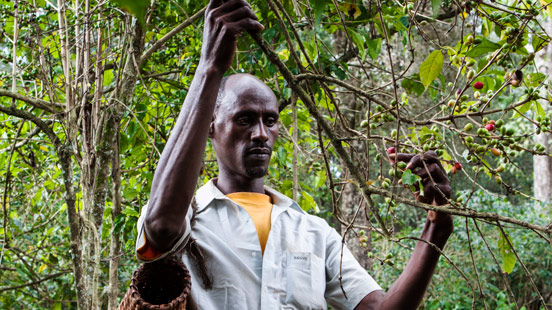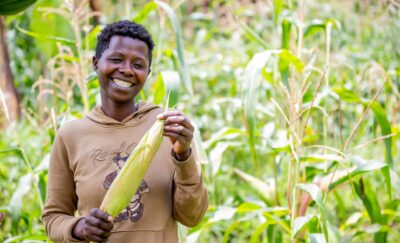Expert view
2 June 2014
Turning back the tide of deforestation in Ethiopia

image: farmer harvesting wild coffee in Ethiopia’s Bale Mountains
By Richard Macdonald, Chair of Farm Africa
After eight hours driving south-east from Addis Ababa, my wife and I have arrived in Ethiopia’s beautiful Bale Mountains. It’s a stunning area and a complete contrast to the honking traffic of Addis.
We are here to learn more about the innovative work Farm Africa is doing to reverse deforestation. Forests may not be what first springs to mind when thinking about Ethiopia, but the Bale Mountains area is home to Africa’s principal Afro-Alpine habitat. It hosts a spectacularly rich bio-diversity – including the extremely rare Ethiopian wolf – at altitudes of up to 4,400 metres above sea level. So it’s vital this unique habitat is protected.
And that’s exactly what Farm Africa is doing through its Forest Management in in Bale eco-region project. The idea is to bring together forestry communities and government to change farming practices and policy for the benefit of the forest.
Since arriving we’ve visited the Birbirse Farmers Co-operative to find out how they are working to move away from making their money from the sale of timber. Instead, they are now developing businesses from renewable forestry products like wild coffee and honey. And thanks to Farm Africa ‘value addition’ training in processing, drying and packaging, they can make more money from these small-scale businesses than they ever could from chopping down trees to sell as timber. In return for developing their sustainable businesses, the regional government gives them some of the best native forest I have ever seen that they can own and preserve for future generations. The effect, of course, is that forest communities now have a real stake in the forest’s survival. And not just in protecting it, but in helping it grow too.
It’s all incredibly inspiring and everyone we met is hugely appreciative of the work Farm Africa is doing to bring forest communities and government together in this partnership that is turning back the tide of deforestation.
Which is hardly surprising when you take a moment to consider the scale of what is being achieved here: farming practices and government policy changed for good in a vast area of approximately 270,000 hectares.




